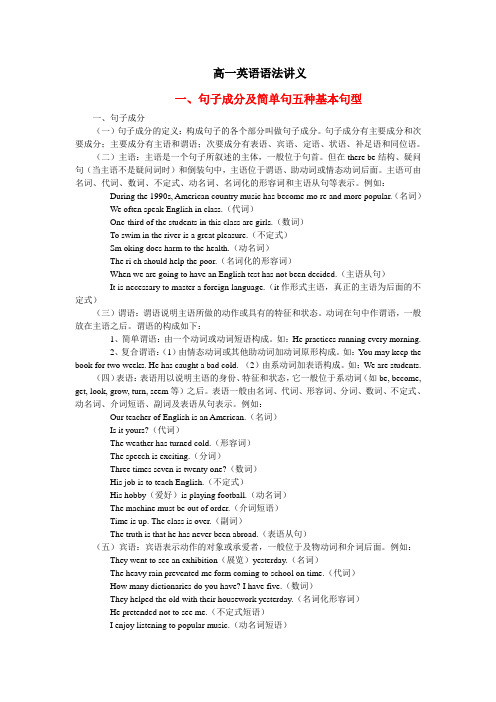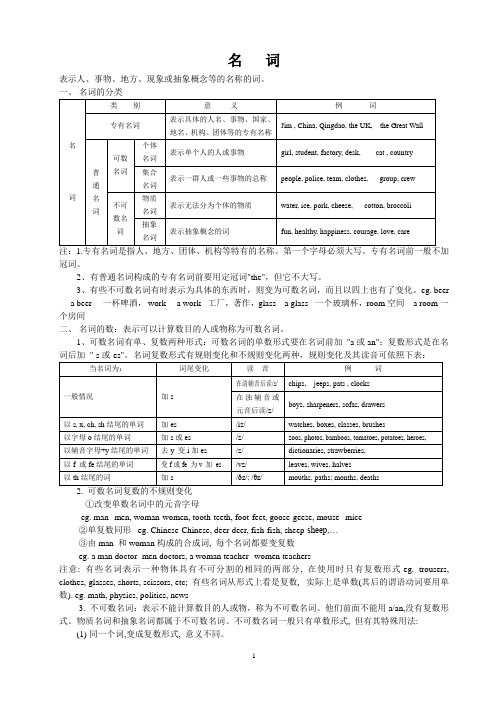[英语学习]语法讲义-精品文档
(完整版)英语语法学习资料

英语语法学习资料(完整版)第一讲名词⏹1.1名词的分类⏹名词可以分为专有名词(Proper Nouns)和普通名词 (Common Nouns),专有名词是某个(些)人,地方,机构等专有的名称,如Beijing,China等。
普通名词是一类人或东西或是一个抽象概念的名词,如:book,sadness等。
普通名词又可分为下面四类:1)个体名词(Individual Nouns):表示某类人或东西中的个体,如:gun。
2)集体名词(Collective Nouns):表示若干个个体组成的集合体,如:family。
3)物质名词(Material Nouns):表示无法分为个体的实物,如:air。
4)抽象名词(Abstract Nouns):表示动作、状态、品质、感情等抽象概念,如:work。
个体名词和集体名词可以用数目来计算,称为可数名词(Countable Nouns),物质名词和抽象名词一般无法用数目计算,称为不可数名词(Uncountable Nouns)。
归纳表格如下⏹ | |专有名词 | || 名 | | 个体名词 | || | |------------| 可数名词|| | | 集体名词 | || |普通名词 | | || 词 | | 物质名词 | || | |------------| 不可数名词|| | | 抽象名词 | |⏹) 以y 1结尾的专有名词,或元音字母+y 结尾的名词变复数时,直接加s变复数:如:two Marys the Henrysmonkey---monkeys holiday---holidays比较:层楼:storey ---storeys story---stories2) 以o 结尾的名词,变复数时:a. 加s,如: photo---photos piano---pianosradio---radios zoo---zoos;b. 加es,如:potato--potatoes tomato--tomatoesc. 均可,如:zero---zeros / zeroes3) 以f或fe 结尾的名词变复数时:a. 加s,如: belief---beliefs roof---roofssafe---safes gulf---gulfs;b. 去f,fe 加ves,如:half---halvesknife---knives leaf---leaves wolf---wolveswife---wives life---lives thief---thieves;c. 均可,如:handkerchief:handkerchiefs / handkerchieves名词复数的不规则变化1)child---children foot---feet tooth---teethmouse---mice man---men woman---women注意:与 man 和 woman构成的合成词,其复数形式也是 -men 和-women。
语法讲义范文范文

语法讲义范文重点语法讲义及练习题目篇一重点语法讲义及练习题目1. 动词的时态和语态1.1 动词的时态和语态一览表时态语态一般现在时一般过去时一般将来时主动被动 doare done didwere done will dowill be done现在进行时过去进行时将来进行时主动被动 are doingare being done were doingwere being done will be doing现在完成时过去完成时将来完成时主动被动 have donehave been done had donehad been done will have donewill have been done现在完成进行时主动被动 have been doing1.2 动词主要时态的意义及运用1) 现在完成时,过去完成时和将来完成时英语提示语:up to now, so far, for three years, since 1995, over past ten years, by the end of this week, by the year of 1995汉语提示语:已经,早已,了e.g. We haven’t met each other since last year.By the end of this week, we’ll have finished the task.2) 现在完成进行时从过去一直持续到现在,没有间断,重点语法讲义及练习。
汉语提示语:一直e.g. The water has been running the whole night.3) 过去完成时a) said, reported, thought等引导的间接引语中。
e.g. He missed the train. He said he had missed the train.b) hardly…when, no sooner… thane.g. No sooner had he got up than he received the call.c) 与过去事实相反的虚拟语气的'条件状语从句中e.g. If I had tried harder, I would have won.I wish I had done better in the exam.历年考题中的动词时态和语态2. In the past two decades, research ___ (expand) our knowledge about sleep and dream.3. Some proverbs ___ (be) in the language for 1,000 years, for example, A friend in need is a friend indeed.4. ___ (stand) at the gate was a young man in green coat.5. In 1991, after the Gulf War, Bush’s approved rating reached 91 percent, the highest level recorded since polling ___ (begin) in the 19302.6. Seeing violence on television or reading about it in the newspapers every day ___ (make) us tolerate crime more than we should.7. So far, Irving ___ (live) in New York City for ten years.8. The patient ___ (send) to another hospital before we got there.9. The second half of the nineteenth century ___ (witness) the first extended translation into English of the writings of Eliphas Levi.10. All the worries they might have felt for him ___ (drive) off by the sight of his cheerful face.Key:2. has expanded 现在完成时3. has been 现在完成时4. Standing 过去进行时的倒装形式5. began 一般过去时6. makes 一般现在时,动名词做主语,谓语用单数7. has been living 现在完成进行时8. had been sent 过去完成时的被动形式9. witnessed 一般过去时10. were driven 一般过去时的被动2. 非谓语动词2.1 动词主要时态和语态一览表非谓语动词形式意义现在分词一般式 Doing 主动,正在进行被动式 being done 被动,正在进行完成主动式 having done 主动,已经完成完成被动式 having been done 被动,已经完成过去分词 Done 被动,已经完成动词不定式一般式 To do 主动,将要进行被动式 To be done 被动,将要进行完成主动式 To have done 主动,已经完成进行主动式 To be doing 主动,正在进行2.2. 非谓语动词作状语动词不定式:1语法是什么篇二时态时态(tense)是一种动词形式,不同的时态用以表示不同的'时间与方式。
(完整word版)高一英语语法(全)讲义精讲

高一英语语法讲义一、句子成分及简单句五种基本句型一、句子成分(一)句子成分的定义:构成句子的各个部分叫做句子成分。
句子成分有主要成分和次要成分;主要成分有主语和谓语;次要成分有表语、宾语、定语、状语、补足语和同位语。
(二)主语:主语是一个句子所叙述的主体,一般位于句首。
但在there be结构、疑问句(当主语不是疑问词时)和倒装句中,主语位于谓语、助动词或情态动词后面。
主语可由名词、代词、数词、不定式、动名词、名词化的形容词和主语从句等表示。
例如:During the 1990s, American country music has become mo re and more popular.(名词)We often speak English in class.(代词)One-third of the students in this class are girls.(数词)To swim in the river is a great pleasure.(不定式)Sm oking does harm to the health.(动名词)The ri ch should help the poor.(名词化的形容词)When we are going to have an English test has not been decided.(主语从句)It is necessary to master a foreign language.(it作形式主语,真正的主语为后面的不定式)(三)谓语:谓语说明主语所做的动作或具有的特征和状态。
动词在句中作谓语,一般放在主语之后。
谓语的构成如下:1、简单谓语:由一个动词或动词短语构成。
如:He practices running every morning.2、复合谓语:(1)由情态动词或其他助动词加动词原形构成。
如:You may keep the book for two weeks. He has caught a bad cold. (2)由系动词加表语构成。
英语语法基础辅导讲义

英语语法基础辅导讲义第一章:英文文法的最基本规则第一章英文文法的最基本规则英文和我们中文最大的不同,是在动词,我们中文的动词很简单,没有所谓的第几人称,也没有复数和单数之分,更没有过去式或进行式,英文可不同了,凡是用动词的时候,必须注意很多很多的规则,一旦弄错了,常常是犯了大错。
在这一章,我要将英文最基本的规则一一列下。
这些规则都是我们中国人所常常不注意的。
为了不要误导读者,凡本书内错误的句子前面都有〝*〞的符号。
规则(1):两个动词是不能联在一起用的。
在中文,我们常说“我是爱你的”,翻成英文,这就变成了*I am love you.滑稽的是,这句英文句子犯了大忌,因为〝am〞是动词,〝love〞也是动词,两个动词是不能联在一起用的。
这句话的正确说法是:I love you. 或者I am in love with you.我们中国人也会说〝我喜欢看电视〞,翻成英文,这变成*I love watch television.这个句子也犯了同样的错。
以下几个句子都是错的,因为这些句子中都有两个动词连在一起的情形:*I hate eat fish.*I love play basketball.*I love swim.如果你一定要讲“我爱游泳”,怎么办呢?请看以下的规则。
规则(2):如一定要同时用两个动词,后者的前面必须加“to”或者将后者加入“ing”。
“我爱游泳”,因此有两种正确的译法:I love to swim.I love swimming.以下的句子都是正确的:I hate to eat fish.I hate eating fish.I love to play basketball.I love playing basketballI keep going to church.规则(3):主词如果是第三人称,现在式及单数,动词必须加s.我们中国人最不容易记得的规则,恐怕就是这一条了,以下的句子都是错的。
英语语法讲义 优质课件

2 It is (high) time that sb. did sth.
It is time that the children went to bed. 3 as if 或 as though
They talked and talked as if they would never meet again. 4 without / but for / in the absence of 后的条件虚拟句
Without air, nothing could live. But for your assistance, we could not accomplish it. In the absence of water and air, nothing could live.
语法体:完成体(perfect)与进行体(progressive) 进行体:I am eating. 完成体:I have eaten.
基本时态结构
1简单现在时 I love your Mercedes. 2现在进行时 You are standing too close to it. 3简单过去时 I wanted a car just like it. 4过去进行时 You were aiming too high. 5一般将来时 I will work for it. 6将来进行时 You will be working forever. 7现在完成时 I have worked hard before. 8现在完成进行时 You have been working for nothing 9过去完成时 I had saved my money. 10过去完成进行时 You had been saving pennies. 11将来完成时I will have saved enough 12将来完成进行时 You will have been saving in vain.
必修五语法讲义范本.doc

•精品.过去分词作——定语.表语、宾补.状语The Past Participle used As Attribute and Predicative第一讲.过去分词做定语和表语1.English is a widely used language・2.He threw away the broken cup・3.This is one of the schools built in 1980s.4.Prices of daily goods bought through a computer can be lower than store prices. 单个过去分词作左语,常放在被修饰词的前而;过去分词短语作左语,常放在被修饰词的后而。
spoken English=English which is spokenterrified people=the people who are terrifiedan organized way=a way that is organized affected area 灾区=the area which is affectedstolen culture relics=culture relics that had been stolenthe book recommended by the teacher=the book which was recommended by the teacher printed articles=articles that are printed1)Doctor John Snow was a wcU-knowH doctor in London.定语2)John Snow told the astonished people in Broad Street.定语3)He got interasted in the two theories・表语4)Neither its cause, nor its cure was imderstood 表语There are many fallen leaves on the ground・=There are many leaves which had fallen on the ground.(地上有许多落叶)Some of them. born and brought up in rural villages, had never been to Beijing.=Some of them , who had been born and brought up in rural villages, had never been to Beijing.(他们中的一些人,在农村岀生并长大,从没去过北京)及物动词的过去分词表示结朿了的被动动作或者没有一左的时间性,只表示被动关系匚polluted water = water which is polluted reserx ed seats= the seats which were reserved trapped animal = the animal which was trapped不及物动词的过去分词不表被动,只表示动作发生在谓语动词之前,含有动作完成,动作结束Z 含义。
英语语法讲义稿(总)

名词表示人、事物、地方、现象或抽象概念等的名称的词。
一、名词的分类冠词。
2、有普通名词构成的专有名词前要用定冠词"the",但它不大写。
3、有些不可数名词有时表示为具体的东西时,则变为可数名词,而且以四上也有了变化。
eg. beer ----a beer 一杯啤酒, work--- a work 工厂,著作,glass---a glass 一个玻璃杯,room空间---a room一个房间二、名词的数:表示可以计算数目的人或物称为可数名词。
1、可数名词有单、复数两种形式:可数名词的单数形式要在名词前加"a或an";复数形式是在名2. 可数名词复数的不规则变化①改变单数名词中的元音字母eg. man--men, woman-women, tooth-teeth, foot-feet, goose-geese, mouse--mice②单复数同形eg. Chinese-Chinese, deer-deer, fish-fish, sheep-sheep,…③由man 和woman构成的合成词, 每个名词都要变复数eg. a man doctor- men doctors, a woman teacher--women teachers注意: 有些名词表示一种物体具有不可分割的相同的两部分, 在使用时只有复数形式 eg. trousers, clothes, glasses, shorts, scissors, etc; 有些名词从形式上看是复数, 实际上是单数(其后的谓语动词要用单数). eg. math, physics, politics, news3. 不可数名词:表示不能计算数目的人或物,称为不可数名词。
他们前面不能用a/an,没有复数形式。
物质名词和抽象名词都属于不可数名词。
不可数名词一般只有单数形式, 但有其特殊用法:(1) 同一个词,变成复数形式, 意义不同。
英语语法学习讲解--实用.doc

英语语法学习第一部分英语语法结构图名词代词数词冠词词性( 9 种)介词连词形容词谓语动词不定式副词非谓语动词分词动词动名词助动词与情态动词词法时态( 16 种)时态与语态语态虚拟语气简单句3:三类句子并列句定语从句语法复合句状语从句名词性从句一般规则6:六种简单句句子句法9:九种句子成分倒装特殊规则比较反义疑问句第二部分词法第一节词性一、副词(一)概念副词( Adverb )是指在句子中表示行为或状态特征的词,用以修饰动词、形容词、其他副词或全句,表示时间、地点、程度、方式等概念。
(二)副词的位置1、一般规则副词一般放在be 动词、助动词或情态动词之后,实义动词之前。
如果实义动词后有宾语,则放于宾语之后。
I am also Bush.我也是布什。
I can also do that.我也可以这样做。
I also want to play that games.我也想玩这游戏。
She didn't drink water enough.她没有喝足够的水。
I have seen this film twice with my friends.这部电影我和朋友看过两次。
2、简化结构中副词位置的变化(1) be 动词简化前:He is really nice.简化后:He really is.( 2)助动词简化前:He can hardly do it.简化后:He hardly can.3、状态副词在被动语态中的位置表示状态的副词在被动语态中,要置于过去分词前。
主动语态: He did the job well.被动语态: The job was well done.4、时间副词和地点副词在一个句中,地点副词在前面,时间副词在后面。
We went shopping in the supermarket at 9 o'clock yesterday.5、副词修饰形容词、副词时,一般放在被修饰词之前,但enough 除外。
- 1、下载文档前请自行甄别文档内容的完整性,平台不提供额外的编辑、内容补充、找答案等附加服务。
- 2、"仅部分预览"的文档,不可在线预览部分如存在完整性等问题,可反馈申请退款(可完整预览的文档不适用该条件!)。
- 3、如文档侵犯您的权益,请联系客服反馈,我们会尽快为您处理(人工客服工作时间:9:00-18:30)。
1.名词、冠词、代词及主谓一致1.1 名词1.1.1 名词的数1.1.1.1 经常用作单数的名词(1) 一些以s结尾的学科、疾病的名称及其他的名词:electronics, physics, optics, linguistics mathematics, politics, statistics, arthritis (关节炎),bronchitis (支气管炎),measles (麻疹),classics, news etc.(2) 无s结尾的一些抽象名词或某些具体名词的总称:information, knowledge, work, advice, weather, fun, luck, trouble, music, progress, happiness, machinery, furniture, equipment, technology, luggage, evidence, homework, etc.1.1.1.2 经常用作复数的名词(1)单数结尾复数概念的名词:people, police, militia, cattle, staff, poultry, livestock, vermin (害虫),personnel, 以及由the +形容词的一类人或物。
(2)复数结尾复数概念的名词:a.本身有两部件组成的物件pants, spectacles, scissors, shoes, trousers, socks. etc.b. 常具有复数词尾,但一般不具有单数的名词如belongings, savings, earnings, surroundings, lodgings (租住的房间), clothes, goods, congratulations, manners (礼貌,规矩),thanks, particulars (细节),spirits(情绪),funds, pains(辛苦),arms (武器),troops, regards.1.1.1.3 某些集体名词的特殊用法某些集合名词如audience, firm, class, government, party, board, couple, crew, committee, family, public, team, group,etc. 既可做复数又可做单数,视具体情况而定。
1.1.1.4 单复同形的名词:fish, deer, aircraft, sheep, youth, Chinese, Japanese, means, species, barracks (兵营),headquarters, crossroads, series, works etc. 其谓语形式视具体情况而定。
1.1.1.5 由连词符构成的名词(1)有主体名词时变主体名词如lookers-on, comrades-in-arms, editors-in-chief, sons-in-law, runners-up, etc.(2) 没有主体名词加在词尾如go-betweens, grown-ups.(3) man 和woman构成的合成名词都要变成复数men-servants, women doctors.1.1.1.6 不规则名词复数变化(1)-sis变-sesanalysis-analyses, crisis-crises, basis-bases, thesis-theses, diagnosis-diagnoses, hypothesis-hypotheses.(2)-um变-adatum-data, bacterium-bacteria, spectrum-spectra, medium-media(3)-us变-inucleus-nuclei, focus-foci(4)-on变-acriterion-criteria, phenomenon-phenomena.1.1.1.7固定结构中的名词复数形式take painsmake arrangements make preparations, be on good terms with be in high/low spirits extend thanks to by means ofgive regards to be at odds with give respects to sing the praises of1.1.2 名词的格’s.(1) 独立属格(Independent Genitive):省略中心名词,名词属格独立充当一定的句子成分。
往往指某人的家、教堂、学校等公共场所,或者店铺、公司等。
如:I’m going to dine at my sister’s.Joe lives near St. Paul’s in London.He was educated at Merchant Taylor’s.He bought some meat at the butcher’s.(2) 双重属格(Double Genitive)独立属格在of 词组后作介词补充成分,就构成双重属格。
如:a friend of my father’s, this brilliant idea of David’s。
适用场合:1)当被修饰的词前面有一个表示数量的词(如:a, two, some, any, no, few等),例如:a painting of my co lleague’ssome students of Lao Yang’s2)当被修饰的词前面有一个指示代词that performance of the teachers’this clever remark of your sister’s用于这种场合的双重所有格多数有爱憎褒贬等感情色彩。
有时of属格与双重所有格意义无甚区别,如:a friend of my brother/a friend of my brother’s有时两种属格意义有很大的区别,如:a portrait of Mr Brown’sa portrait of Mr Brown(3)常用习语to one’s heart’s content at one’s wit’s end for God’s sakein one’s mind’s eye1.1.3 名词的修饰语(1)用于某些物质名词或不可数名词前的量词/单位词a piece of: advice, bread, cake, chalk, work, furniture, cloth, paper, news, information, evidence, luggage, luck, business, etc.an item of news /informationa cake of soap/ muda drop of water/ oil/ whiskyan article of clothes/ luggage/ furniture a bar of chocolate/ soap/ iron/gold an ear (穗) of wheat/ ricea loaf of breada lump of coal/sugar/ claya slice of bread/ bacon/meat/cake一群:a flock of birds/ visitors/ customers a herd of bees/ants/starsa pack of thieves/ wolves/hounds a bunch of keys/bananas/grapes/roses a crowd of people/booksa gang of bandits/robbersa bundle of clothes/ letters/bank-notes/firewood(2) 名词被多个形容词修饰的次序限定词(冠词,指示代词,数量词)表示大小,高度,长度的词表示年龄的词表示颜色的词(包括国名)a big beautiful green housethis pretty little Swedish girl(3) 名词前有修饰语so, such, as, too, rather, quite, fairly 等词时的位置so difficult a problemtoo difficult a problemsuch a difficult problemas difficult a problem as the one we solved last weekquite a difficult problemrather a difficult problem / a rather difficult problema fairly good book.So 只用于后续单数可数名词,so many/ much/ little除外,例a. so strange a woman (正)b. so strange people (误)a. so beautiful a garden (正)b. so bad weather (误)练习1. Don’t you think the surroundings too ugly?A. is being.B. has beenC. isD. are2. The rest of the crew of this ship going to come back home.A. are notB. has not beenC. is notD. have not been3. The doctor checked up my heart.A. mother’s-in-lawB. mother-in-lawC. mother-in-law’sD. mother-in-laws4. The class unanimous in decision.A. was; itsB. were; theirC. have been; theirD. did; its5. Our school bought yesterday.A. Many fire equipmentsB. many fire equipmentC. many pieces of fire equipmentsD. much fire equipment6. This pair of scissors sharper than that one.A. areB. have beenC. isD. has been7.We will not be if such a thing happens again.A. looker-onsB. lookers-onsC.lookers-onD. looker-on8. After hearing the bad news, everyone wasA. in his low spiritsB. in low spiritC. in his low spiritD. in low spirits9. , they decided to give up the plan.A. On second thoughtsB. On second thoughtC. on the second thoughtsD. on the second thought10. I sangA. to the content of my heartB. to my heart contentC. to the contents of my heartD. to my heart’s content11. There are waiting in his office.A. some Mr. Black’s students.B. Mr. Black’s some studentsC. some students of Mr. Black’sD. some of students of Mr. Black12. The most amusing animals in the zoo were the chimpanzees.A. playful, blackhaired, AfricanB. playful, African, blackhairedC. blackhaired, playful, AfricanD. African, blackhaired, playful1.2 冠词1.2.1 定冠词the(1)上文提到的事物或人(2) 世上独有的事物,自然现象,天体,方位,左右等如the world, the sun , the earth, the moon, the night, the wind, the right, the left, the east (south, north, west).3)用在带有限定性修饰语的名词前Is this the train to Shanghai?4) 用在最高级之前,或当主要对两个事物或人进行比较时the用在形容词比较级之前起特指作用。
